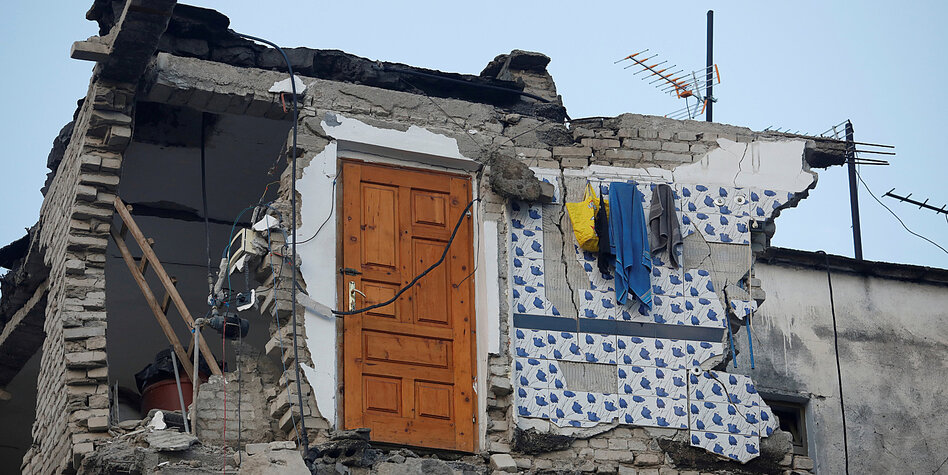Reportage
Earthquake in Albania spotlights real estate speculation
Controversial urban projects are defacing the Albanian landscape, such that even the International Monetary Fund is uncomfortable with the pace of development.

“Welcome to the Republic of Concrete Mixers!” Mirela Jorgo can certainly be forgiven for a little sarcasm on the day after the earthquake that struck Albania, the strongest one in 40 years. Here, solidarity is mixed with anger after a tragedy that could have been avoided, at least in part. A lawyer and activist, Jorgo has been at the forefront of the fight against real estate speculation in Durres, the city most devastated by the earthquake, for many years.
She was the one who led the legal battle against the “Veliera,” the controversial urban project worth €4.6 million presented by the municipality of Durres in April 2016. The project’s goal was to redevelop an area of 12,000 square meters in front of the city’s port, a plan that met with strong opposition from the very beginning on the part of Albanian activists, archaeologists and geologists. Their protests came to naught.
After work began in November 2017, archeological findings in the form of walls and an old cemetery were discovered near the Venetian Tower, the city’s fortress. Now, those findings are in danger of being lost under the endless pouring of concrete, as decreed by the new elite of wealthy illegal developers. This phenomenon is a plague that is defacing Albanian territory everywhere, from Durres to Tirana and from Fier to Vlora. According to data from the Albanian Institute of Statistics (INSTAT), in 2017 alone, 819 building permits were issued in Albania, 105 of which in Durres alone, putting it in third place after Tirana and Fier. This was an increase of 88.3% compared to the previous year.
Last year, the scourge of abusive real estate developments even managed to draw some criticism from the International Monetary Fund (IMF), which asked Tirana to suspend some projects in the pipeline because they had been approved within an institutional framework that was considered to be unacceptably makeshift. “Each concession, including some recent major ones, come out of a not very formal process,” an IMF representative complained, stressing the need for a more thorough cost-benefit analysis that would also take into account the public debt. But even these recommendations fell on deaf ears.
“The Rama government has done nothing in recent years but flood Albania with cement,” Jorgo explains, “and it has done so while showing contempt towards the civic movements that have been fighting against these senseless policies for years. Today, we are only reaping the fruits of these choices.”
These choices have transformed the coastal area into a theme park for tourists, devastated by the myriad resorts and living houses built on the cliffs overlooking the Adriatic without any regard for archaeological sites, without any sustainable building plan and without any consideration of the hydrogeological fragility of a country rich in rivers and mountains.
The municipality of Durres has been one of the main beneficiaries of the “Urban Revival” program financed by the government through the Regional Development Fund. From 2014 to 2017, Durres received over €22.4 million to implement 29 projects. Of these, the Veliera has become the most symbolic, showcasing the arrogance of real estate speculators who will not stop even when it means destroying the cultural heritage of the city.
Jorgo lost that particular battle. Today, before the rubble that is left of one of the oldest Albanian cities, she is angrier than ever. This is because there was a very clear political choice that lay behind the current situation, with a country that is literally collapsing. Lurking behind this choice is not only the greed of the real estate developers, but, above all, the money laundering activities of organized crime, which has dramatically increased its influence in the country in recent years, often hand in hand with the ruling class.
Jorgo is not hiding her disappointment, especially in the country’s Socialist prime minister, who “promised a bright future for Albania, but instead has taken the country back at least 30 years. People continue to leave this place,” Jorgo adds. “There is no justice, there is no hope. Here you can see the two faces of Albania very well, that of real estate speculation by the powerful and that of ordinary people who live on €200 per month. I don’t know if this will be the end of Edi Rama, but he certainly has nothing more to offer this country. Nothing except more poured concrete.”
Originally published at https://ilmanifesto.it/durazzo-una-colata-di-cemento-sulladriatico/ on 2019-11-27
